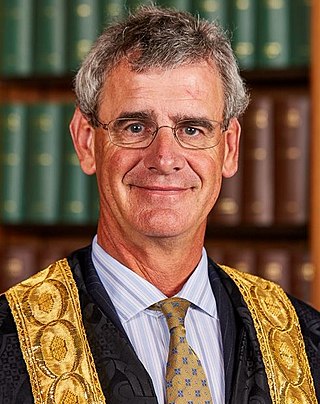
Breach of contract is a legal cause of action and a type of civil wrong, in which a binding agreement or bargained-for exchange is not honored by one or more of the parties to the contract by non-performance or interference with the other party's performance. Breach occurs when a party to a contract fails to fulfill its obligation(s), whether partially or wholly, as described in the contract, or communicates an intent to fail the obligation or otherwise appears not to be able to perform its obligation under the contract. Where there is breach of contract, the resulting damages have to be paid to the aggrieved party by the party breaching the contract.

In contract law, an integration clause, merger clause, is a clause in a written contract which declares that contract to be the complete and final agreement between the parties. It is often placed at or towards the end of the contract. Any pre-contractual material which the parties wish to be incorporated into the contract need to be assembled with it or explicitly referred to in the contractual documentation.

The doctrine of legitimate expectation was first developed in English law as a ground of judicial review in administrative law to protect a procedural or substantive interest when a public authority rescinds from a representation made to a person. It is based on the principles of natural justice and fairness, and seeks to prevent authorities from abusing power.
Young v. Bristol Aeroplane Co Ltd was an English court case that established that the Court of Appeal is bound to follow its own decisions and those of courts of co-ordinate jurisdiction, except in the following cases:
- the court is entitled and bound to decide which of two previous conflicting decisions of its own it will follow;
- the court is bound to refuse to follow a decision of its own which cannot stand with a decision of the House of Lords;
- the court is not bound to follow a decision of its own if the decision was given per incuriam, e.g., where a statute or a rule having statutory effect which would have affected the decision was not brought to the attention of the earlier court.

English contract law is the body of law that regulates legally binding agreements in England and Wales. With its roots in the lex mercatoria and the activism of the judiciary during the industrial revolution, it shares a heritage with countries across the Commonwealth, from membership in the European Union, continuing membership in Unidroit, and to a lesser extent the United States. Any agreement that is enforceable in court is a contract. A contract is a voluntary obligation, contrasting to the duty to not violate others rights in tort or unjust enrichment. English law places a high value on ensuring people have truly consented to the deals that bind them in court, so long as they comply with statutory and human rights.
Hyde v Wrench [1840] EWHC Ch J90 is a leading English contract law case on the issue of counter-offers and their relation to initial offers. In it Lord Langdale ruled that any counter-offer cancels the original offer.

The Law of Property Act 1989 is a United Kingdom Act of Parliament, which laid down a number of significant revisions to English property law.

Michael Townley Featherstone Briggs, Lord Briggs of Westbourne, is a Justice of the Supreme Court of the United Kingdom. He served earlier as a judge of the Court of Appeal of England and Wales.

The doctrine of legitimate expectation in Singapore protects both procedural and substantive rights. In administrative law, a legitimate expectation generally arises when there has been a representation of a certain outcome by the public authorities to an individual. To derogate from the representation may amount to an abuse of power or unfairness. The doctrine of legitimate expectation as a ground to quash decisions of public authorities has been firmly established by the English courts. Thus, where a public authority has made a representation to an individual who would be affected by a decision by the authority, the individual has a legitimate expectation to have his or her views heard before the decision is taken. Alternatively, an individual may also have a legitimate expectation to a substantive right. The recognition of substantive legitimate expectations is somewhat controversial as it requires a balancing of the requirements of fairness against the reasons for any change in the authority's policy. This suggests the adoption of a free-standing proportionality approach, which has been said not to apply in administrative law.
Sir Christopher Stephen Thomas Jonathan Thayer Staughton, PC was an English barrister and judge, who sat as a justice of the High Court of Justice, Court of Appeal of England and Wales and President of the Court of Appeal of Gibraltar.
Illegality in English law is a potential ground in English contract law, tort, trusts or UK company law for a court to refuse to enforce an obligation. The illegality of a transaction, either because of public policy under the common law, or because of legislation, potentially means no action directly concerning the deal will be heard by the courts. The doctrine is reminiscent of the Latin phrase "Ex turpi causa non oritur actio", meaning "no cause of action arises from a wrong". The primary problem arising when courts refuse to enforce an agreement is the extent to which an innocent party may recover any property already conveyed through the transaction. Hence, illegality raises important questions for English unjust enrichment law.

Administrative law in Singapore is a branch of public law that is concerned with the control of governmental powers as exercised through its various administrative agencies. Administrative law requires administrators – ministers, civil servants and public authorities – to act fairly, reasonably and in accordance with the law. Singapore administrative law is largely based on English administrative law, which the nation inherited at independence in 1965.

Illegality is one of the three broad headings of judicial review of administrative action in Singapore, the others being irrationality and procedural impropriety. To avoid acting illegally, an administrative body or public authority must correctly understand the law regulating its power to act and to make decisions, and give effect to it.
An employment contract in English law is a specific kind of contract whereby one person performs work under the direction of another. The two main features of a contract is that work is exchanged for a wage, and that one party stands in a relationship of relative dependence, or inequality of bargaining power. On this basis, statute, and to some extent the common law, requires that compulsory rights are enforceable against the employer.

Sinclair Investments (UK) Ltd v Versailles Trade Finance Ltd[2011] EWCA Civ 347 is an English trusts law case, concerning constructive trusts. Sinclair was partially overruled in July 2014 by the UK Supreme Court in FHR European Ventures LLP v Cedar Capital Partners LLC.

FHR European Ventures LLP v Cedar Capital Partners LLC[2014] UKSC 45 is a landmark decision of the United Kingdom Supreme Court which holds that a bribe or secret commission accepted by an agent is held on trust for his principal. In so ruling, the Court partially overruled Sinclair Investments (UK) Ltd v Versailles Trade Finance Ltd in favour of The Attorney General for Hong Kong v Reid (UKPC), a ruling from the Judicial Committee of the Privy Council on appeal from New Zealand.

Sir Geoffrey Charles Vos is a judge in England and Wales. Since January 2021, he has held the position of Master of the Rolls, and the head of civil justice in the court system of England and Wales.

The British Post Office scandal is a miscarriage of justice involving the wrongful civil and criminal prosecutions of an unknown or unpublished number of sub-postmasters (SPMs) for theft, false accounting and/or fraud. The cases constitute the most widespread miscarriage of justice in British legal history, spanning a period of over twenty years; it remains unresolved.

Sir Jonathan Frederic Parker is a retired British Lord Justice of Appeal.










